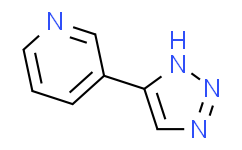| Cas No.: | 120241-79-4 |
| Chemical Name: | 3-(1H-1,2,3-Triazol-4-yl)pyridine |
| Synonyms: | Pyridine,3-(1H-1,2,3-triazol-5-yl)-;3-(1H-1,2,3-Triazol-4-yl)pyridine;3-TYP;Pyridine, 3-(1H-1,2,3-triazol-4-yl)- (9CI);Pyridine(3-TYP);3-(1H-1,2,3-triazol-5-yl)pyridine;3-(1,2,3-triazol-4-yl)pyridine;3-(1H-1,2,3-triazol-4-yl) pyridine;Pyridine,3-(1H-1,2,3-triazol-4-yl)- (9CI);3-(2H-triazol-4-yl)pyridine;pyridin-3-yl-triazole;BDBM17471;VYXFEFOIYPNBFK-UHFFFAOYSA-N;BCP25686;4-(3-Pyridyl)-1,2,3-triazole;4-(3-Pyridinyl)-1H-1,2,3-triazole;AK204058;3-(2 |
| SMILES: | N1=C(C([H])=NN1[H])C1=C([H])N=C([H])C([H])=C1[H] |
| Formula: | C7H6N4 |
| M.Wt: | 146.1493 |
| Sotrage: | 2 years -20°C Powder, 2 weeks 4°C in DMSO, 6 months -80°C in DMSO |
| Description: | 3-TYP is a selective SIRT3 inhibitor, with an IC50 of 16 nM, more potent over SIRT1 (IC50=88 nM), SIRT2 (IC50=92 nM). |
| In Vivo: | 3-TYP (50 mg/kg, i.p.) does not significantly influence the LVEF, LVFS, infarct size, serum LDH levels, apoptosis, and oxidative stress compared with those of the Sham group. Moreover, 3-TYP has little effect on gp91phox, Nrf2, NQO 1, Bax, Bcl-2, Caspase-3, and cleaved Caspase-3 expression levels, compared with the Sham group. 3-TYP significantly decreases SIRT3 activity and increases the acetylation of SOD2 compared with that in the control group, without influencing SIRT3 expression. 3-TYP attenuates the cardioprotective effects of melatonin by decreasing the LVEF and LVFS after 24 hour of reperfusion. 3-TYP also increases the infarct size, serum LDH levels, and apoptotic ratio compared with those in the IR+Mel group[2]. |
| In Vitro: | 3-TYP inhibits melatonin-enhanced SIRT3 activity but does not affect SIRT3 protein expression. 3-TYP pretreatment reverses the protective effects of melatonin on cadmium (Cd)-induced mitochondrial-derived O2•− production and autophagic cell death. 3-TYP significantly attenuates melatonin-induced increases in deacetylated-SOD2 expression and SOD2 activity in HepG2 cells exposed to Cd[1]. |

 DC Chemicals' products qualify for U.S. tariff exemptions. We guarantee no price increases due to customs duties and maintain stable supply, continuing to deliver reliable research solutions to our American clients.
DC Chemicals' products qualify for U.S. tariff exemptions. We guarantee no price increases due to customs duties and maintain stable supply, continuing to deliver reliable research solutions to our American clients.





















